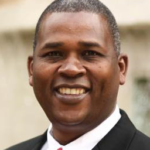Q1: Is the influence of the Kenyan tribal religions strong?
In Kenya, we have many different religions. The majority of Kenyans are Christian of one kind or another. But there are also Muslims, Hindus, a very few Buddhists. And we also have the tribal religions, which have a lot of influence even on people who call themselves Christians.
The tribal religions feature numerous rituals. According to these tribal religions, there are evil and good spirits out there. It’s a very spiritual worldview. And the traditional tribal religions teach that these rituals are needed in order to appease the spirits.
On the one hand, this means that Kenyans are tempted to drift back into these rituals—since it is easier to believe a sacrifice you can see, such as sacrificing a goat for cleansing, than to believe in Jesus that you cannot see. On the other hand, this spiritual worldview means that it is not hard for Africans to grasp the Holy Spirit. This is why Pentecostalism has swept through Africa like a wildfire.
Q2: What is some of the work you’ve seen God do to bring His kingdom in Kenya?
When I came back in 2014 [after studying in the United States for ministry], I noticed there were some very good developments in the Christian world in Kenya. We now have lots of prayer retreat places where people go and spend time praying—even all night prayer if you want. We have three major prayer centers here in Naikuru. People go as families, groups, individuals, church leadership teams. God has done a great work on the church in Kenya in prayer. That’s what really impressed me when I came back.
Q3: Are there any differences you notice in how Kenyans pray from how Americans tend to pray?
As far as similarities, we all pray in the name of Jesus. We go to God in prayer. But the difference here lies in the aggressiveness of our prayers. In the Garden of Gethsemane, Jesus told His disciples to watch and pray, for His soul was heavy with sorrow. When He came back, He saw that they had prayed for a very short time. They had either run out of things to pray or the drive to pray. And Jesus said, “You couldn’t even pray for one hour?”
The difference is that, here, people can remain in prayer much longer, crying out to God. People here will go out and spend nights praying and fasting. Here, they will cover lots of areas in their prayers. Disciples here—their prayers are very comprehensive. They will pray not just for themselves, but for the entire church, the government, the unsaved.
My experience in the US is that people’s prayers tend to be self-centered.
I don’t know how many people, when they take time out to pray, remember to pray for the body of Christ, for those who are not born again, or for those who are suffering for their faith, not just them. I notice that the longest people will pray in the US is 5 or 10 minutes, and the person has run out of words. This is what Jesus was saying: “Could you not even pray for an hour?”
Q4: What is an answered prayer that you have experienced recently?
In 2013 when I was getting ready to graduate, I was working in the library of the seminary. I felt a very strange visitation. I felt like the Holy Spirit was speaking to me. I started groaning, having lots of pain.
The burden I was feeling was for the Kenyan men.
It’s like God put in me an amazing pain for the lost men of Kenya. I went into one of the prayer closets in the seminary. I was there for 10 minutes. God impressed on me very hard things about men. I heard God tell me, “I mourn My lost sons.” And for 10 minutes, God spoke to me about the consequences of the man who no longer lives doing his God-ordained role as the priest, provider, and protector of his family.
I decided then and there that when I moved back to Kenya I would begin a men’s ministry. When I came back, I started holding meetings to bring men back to their God-ordained roles.
You go to any church here in Kenya, and you’ll notice that round 80% are women and children. When I came back to Kenya and saw the same in my church, I told them that God has called me not just to be a pastor, but to call men back to their God-ordained roles. I told them that this church is going to set the pace, to lead, to believe God that men are going to begin coming back to the church. I told them, one of these days, we’re going to have equal number of men to women.
Last March, I told the men to stand up, and the church was amazed. It was almost equal to the women in the church. God has answered my prayer.
I feel like God is saying, yes, I’m happy you accepted the call. And He is confirming that men can come back to Him.











